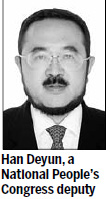Government and Policy
Declaring assets should be a legal duty, says NPC deputy
By Hu Yinan (China Daily)
Updated: 2010-03-12 06:53
 |
Large Medium Small |

BEIJING: For Han Deyun, a National People's Congress deputy, a moderate, rational stance is needed from all parties in order for a mechanism requiring officials to declare their assets to succeed.
"National legislation will act as a very powerful signal for all officials, who will in time realize that having their assets open to the public is not only a moral obligation, but a legal duty," he told China Daily in an exclusive interview.
The enactment of a relevant law - the foundation for the system - is paramount, Han said.
In recent years, a handful of prefecture-level cities have implemented pilot programs requiring officials - albeit mostly at fairly low levels of the government - to post information about their finances.
But while the local initiatives have been widely applauded, the extent of their openness has been questioned.
Officials, for their part, see the exposure of their finances as an invasion of privacy and remain largely skeptical, if not directly opposed to the idea.
Han said the mechanism's preventive function is most important.
"Focusing more on its function to punish would pose a very difficult challenge to its introduction," he said. "The desire to deal with past evils lacks a legal basis because the truth is, officials haven't been asked to disclose their finances to the public before."
People may believe officials are not disclosing everything, but they need to realize that any disclosure at all is a good first step, he said.
Officials on the Chinese mainland have been required to report their properties to superiors since 1995. More than a decade's experience of internal supervision has laid a solid foundation for supervision on a much broader level, said Han.
Once a national law is enacted, Han suggests that the central government should authorize local governments to gradually promote the mechanism in selected fields "where corruption is most likely to take place to avoid frustration over the possibility of an all-out campaign".
Han claims that a property declaration system is the only way to deepen democracy and stop corruption.
"The earlier we do it, the better. The later this legislation, the heftier a price we will pay," he said.











